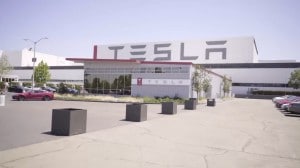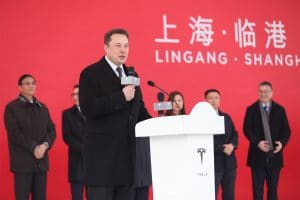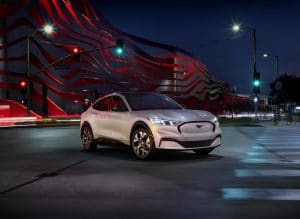
Tesla’s stock has been rising like a rocket in recent weeks, although it slid back a bit during the last two days.
Three U.S. automakers. Three very different approaches to a fast-changing industry. And Wall Street investors are taking sharply divergent views when it comes to Tesla, Ford and General Motors this week.
The big news is clearly the California EV manufacturer. Though traders on Wednesday did account for the fact that the coronavirus is going to stall Model 3 deliveries in China for a few weeks, sending Tesla shares sliding from the all-time high of $845.98 just a day before, the mid-afternoon Thursday numbers, at around $725 a share, still positions the automaker as more valuable than GM and Ford combined – with Fiat Chrysler thrown in for good measure.
Actually, that comparison got a bit easier this week, investors clearly not happy with the unexpectedly poor fourth-quarter showing by Ford, their concerns worsened by the second-largest U.S. automakers weak forecast for 2020.
(Tesla stock sets new high, surging past $900 a share)
As for GM, the carmaker was truly hoping to break out of its rut and show some momentum, CEO Mary Barra laying out a bullish vision of the future during a Capital Markets Day event in New York City. That seemed to do little to inspire confidence, though the automaker at least avoided the wholesale plunge of its cross-town rival.

Tesla’s stock may have tumbled a bit after it investors realized the coronavirus could crimp Model 3 deliveries in China.
Sir Isaac Newton might be pleased with the downturn at Tesla, industry analysts having little to say that could clearly justify the battery-carmaker’s massive surge that saw its shares, as of Tuesday’s market close, deliver a 300% gain in barely two months.
“Theories abound, including many of the tried and true: It’s the result of CEO Elon Musk delivering record revenue and his fourth quarterly profit in six periods; or it’s a short squeeze; or it’s the opening of a key new factory in China; or it’s an extreme case of FOMO sweeping across the investor community. Or it’s a combination of all of the above,” Bloomberg news analysts postulated Wednesday, admitting the run-up also might have nothing to do with any of those theories.
The fact is that Tesla did deliver record sales in 2019 – but it also posted another loss during the final quarter. The company is suggesting it might hit a new record this year of more than 500,000 once its Shanghai factory gets up to speed. But the EV market there tumbled last year and, now, it’s anyone’s guess as to what impact the coronavirus epidemic will have on the market which, overall, posted a rare sales slump in 2019.
There are some who clearly aren’t happy with Tesla’s run-up. Short-sellers continue to hold about 20% of its shares – and continue to post massive losses with each new surge. Then there are the Saudis whose sovereign investment fund managers misread things and wound up selling off 99.5% of their Tesla holdings late last year.

GM Chairman and CEO Mary Barra said the company is well-positioned for the long term. The company’s EV development program has some excited.
There were lots of folks selling off Ford shares Wednesday, Wall St. clearly unhappy with the automaker’s meagre $47 million full-year profit – a decline of $3.6 billion from 2018’s numbers.
Ford has been in the doldrums for quite some time. Its poor stock performance was a clear factor in the ouster of CEO Mark Fields nearly three years ago and the rumor mill contends that his successor, Jim Hackett, may have to pull off some magic when his own contract comes up for renewal in a few months.
Ford stock Is hovering barely above the $8 mark mid-Thursday afternoon, down from a $10.56 52-week high.
(Disastrous fourth quarter hurts Ford’s full-year earnings)
Hackett has made a case for major change at the Dearborn automaker, ironically echoing the argument Tesla’s Elon Musk has long made, that the market is going electric. But it is still a company relying on the internal combustion engine and, in particular, gas- and diesel-powered pickups and SUVs. What really disappointed everyone about last year’s performance was the disastrous launch at the Ford plant in Chicago, quality issues hammering production of the latest Ford Explorer and new Lincoln Aviator.

Ford CEO Jim Hackett said poor execution of the company’s hurt the company’s earnings performance in 2019.
Looking forward, meanwhile, Ford had a less than overwhelming forecast for 2020, predicting EBIT – or earnings before interest and taxes – of somewhere between $5.6 billion and $6.6 billion, barely getting back to 2019 levels.
“It’s not clear to us exactly what is driving the profit lower. …The lack of transparency is not likely to sit well with investors or inspire confidence,” wrote RBC Capital Markets analyst Joseph Spak, while reducing his prior target price on Ford stock from $10 to just $9.
One of the real tests for Ford will come next autumn with the launch of the automaker’s first long-range electric vehicle, the Mustang Mach-E. A strong showing could give Hackett’s push into “mobility” technologies a much-needed boost But anything short of solid early sales could really unplug his remaining backers.
General Motors, meanwhile, has laid out an even more aggressive electrification strategy than Ford, CEO Mary Barra again on Wednesday promising the company is on “a path to an all-electric future.”
The biggest of the traditional U.S. manufacturers will launch its second long-range BEV, a Cadillac SUV, this year. It also used a costly Super Bowl spot to reveal the all-electric pickup, the GMC Hummer, that will follow in 2021.
Barra tried to build support among Wall Street analysts, pitching the company’s “cultural transformation.” And GM tried to soften concerns about last year’s bitter UAW strike – which cost it about $2.6 billion – by promoting the benefits the eventual contract delivered.

The Mustang Mach-E was one of the company’s highlights for 2019, but it’s not adding to the bottom line until it arrives next year.
But, at best, investors came away unconvinced, in part due to a relatively soft forecast for 2020 profits. GM expects something on the order of $5.75 to $6.25 per share compared to a consensus forecast of around $6.23.
(Strike cost GM $2.6 billion, earnings down to $6.7 billion for 2019)
What could happen in the days and weeks to come is far from certain. Few would be surprised to see Tesla settle back from the extremes reached earlier in the week – though there are few signs it might settle back to the levels it hovered in last autumn. Detroit automakers, on the other hand, simply can’t find the magic formula that generates even the most modest level of real enthusiasm.
